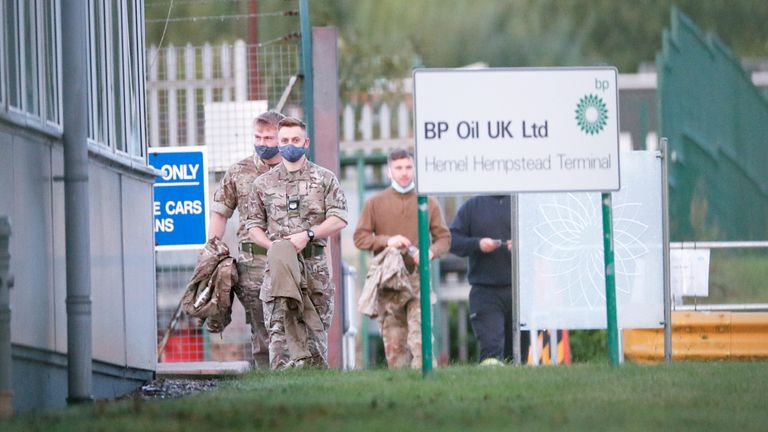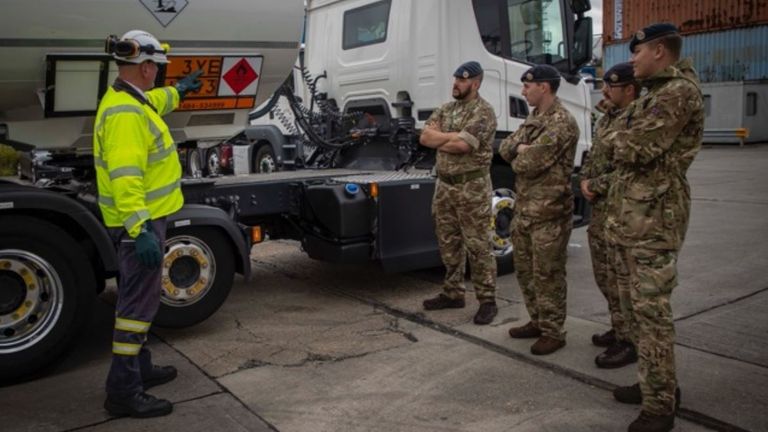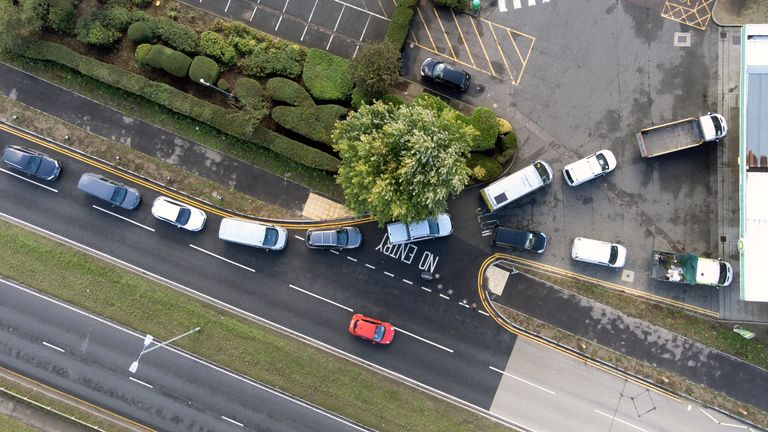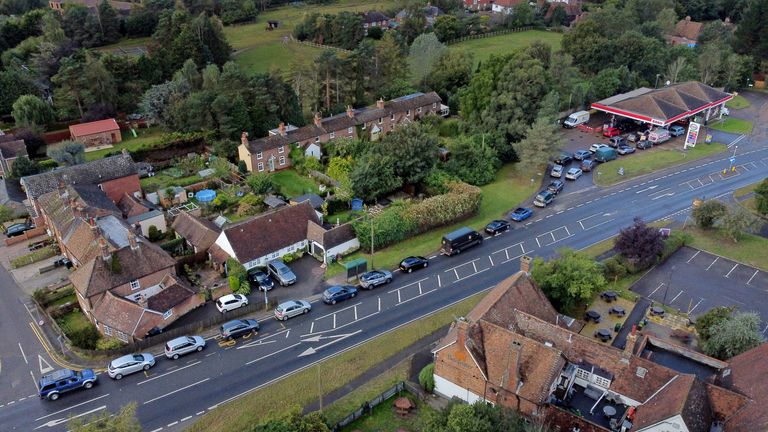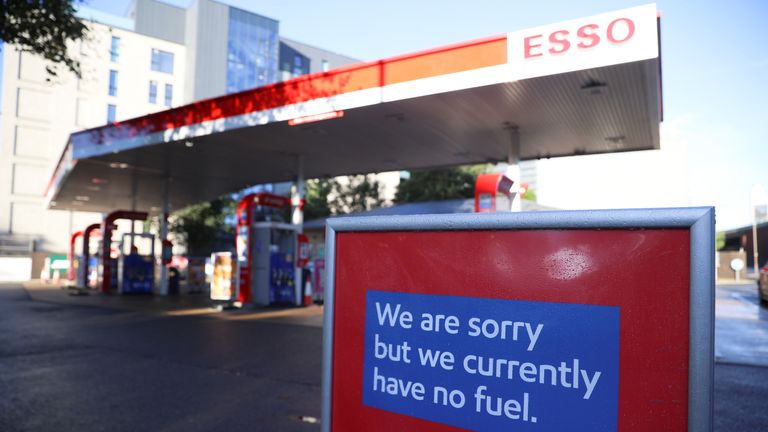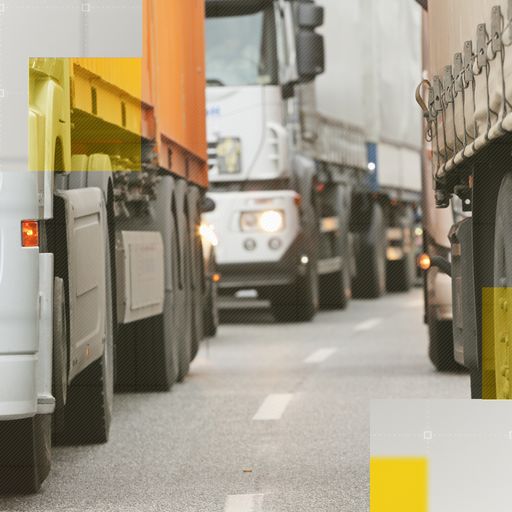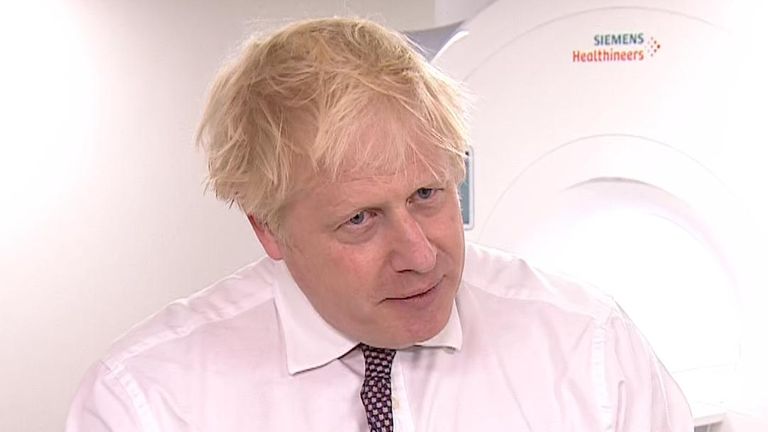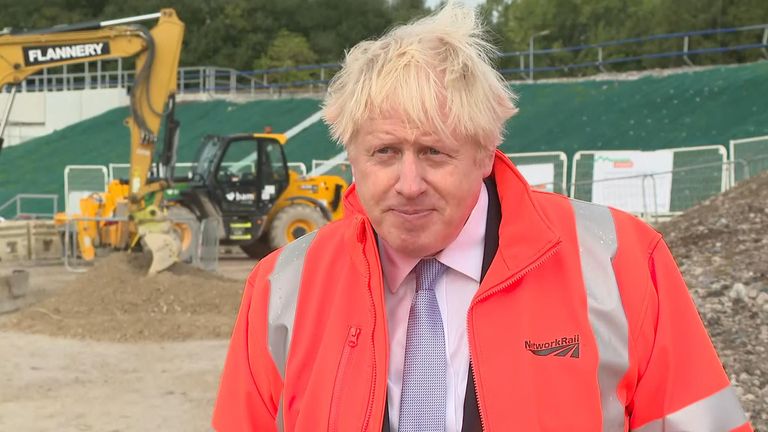‘Improvement’ in UK fuel supply but some areas ‘still challenging’ – as major chain removes £30 cap
The fuel crisis in parts of the UK is “still challenging”, a petrol boss has warned, as the armed forces were drafted in to help deliver fuel amid ongoing driver shortages.
About 200 military personnel – half of them drivers – have been deployed in London and the South East, where the worst shortages remain, as part of Operation Escalin in an effort to increase the number of tanker drivers.
However, EG Group – which runs about 400 UK petrol stations in partnership with Esso, BP and Shell – announced on Monday afternoon that it was removing its £30 cap on buying fuel as the situation on its forecourts has improved.
An EG Group spokesperson said: “Following a significant improvement in fuel availability at our sites, with customer purchasing behaviour returning to normal levels in the majority of locations, we are pleased to confirm that we can now remove the £30 cap on buying fuel.
“That said, we still continue to experience some challenges, primarily in our locations in the south and the south east, but following the actions from the government to secure additional drivers from the military this week, we expect availability issues easing in the coming days.”
The Petrol Retailers Association (PRA) said the fuel situation in London and the South East remains “challenging”, despite shortages easing in much of the country.
A statement from executive director Gordon Balmer said: “Today’s figures show the situation is still challenging around London and the South East despite a marginal improvement: 62% of the sites surveyed have both grades of fuel available, 18% have only one grade and 20% are dry.
“Across the rest of the country, however, there has been a marked improvement since yesterday with 86% of sites having both grades of fuel thanks to steady deliveries and stabilising demand, 6% having only one grade and 8% being dry.”
Photographs this morning showed personnel – believed to be airmen – arriving at the Buncefield Oil Depot in Hemel Hempstead, Hertfordshire, to begin helping with the deliveries.
Many of them have been training with petroleum logistics company Hoyer in Thurrock, Essex.
Ministers have faced criticism for not sending them out earlier after a wave of panic-buying – prompted by reports that supplies to filling stations were being hit – led to chaos on the forecourts.
A government spokesman said: “We are working closely with industry to help increase fuel stocks and there are signs of improvement in average forecourt stocks across the UK with demand continuing to stabilise.
“Stocks in London and the south of England have been recovering at slightly slower rates than other parts of the UK, so we have begun deploying military personnel to boost supply in these areas.
“More than half of those who have completed training to make fuel deliveries are being deployed to terminals serving London and the South East of England, demonstrating that the sector is allocating drivers to areas most affected in this first phase from Monday.”
By late morning on Monday, queues developed outside petrol stations in London, Hemel Hempstead, and Ashford in Kent.
Asked when fuel supplies would return to normal, Number 10 said it could not put a date on it as it would depend on demand.
The prime minister’s official spokesman added: “We’re taking every possible step to bolster supply and we’re seeing… we’re delivering supply significantly over normal levels every single day, and we’ll continue to do that 24 hours a day.”
Questioned about the continuing supply chain issues, Boris Johnson defended his government’s approach and doubled down on it.
“When you talk about some of the supply chain issues, that’s really a function of the world economy, particularly the UK economy, coming back to life after COVID, sucking in gas in particular, there’s massive demand for that in Asia,” the prime minister said.
“There’s a shortage of lorry drivers actually around the world, from Poland to the United States, even in China they’re short of lorry drivers.
“What we want to see is a high wage, high skill economy where we invest in people, invest in fantastic infrastructure like this behind me, and drive high productivity growth.
“That’s the model we should be going for.”
Operation Escalin was originally drawn up in preparation for possible fuel shortages following Britain’s final withdrawal from the EU single market at the start of the year.
Number 10 said the initial request for armed forces help lasted for 31 days but that the government would continue the discussion with the industry over what would happen next.
The PRA welcomed the military deployment but suggested it would have only a limited impact.
Mr Balmer told Sky News that out of 1,100 sites it spoke to, some have been empty for over a week.
He added that the “pinch point” of the problem is in the South East and that it may take up to 10 days for some areas to build supply back to normal levels.
Mr Balmer also said there “may be a good chance” shortages could last up until Christmas if “drivers can’t get through to solve the problem”.
MP Penny Mordaunt said she had been in touch with fuel outlets in Portsmouth that have had no deliveries for nearly a week.
She tweeted: “Surveyed forecourts last night and been directly in touch with managers in Portsmouth this morning.
“Still stations that have had no deliveries and have been completely out of both petrol and diesel for nearly a week.”
Follow the Daily podcast on Apple Podcasts, Google Podcasts, Spotify, Spreaker
Meanwhile, Mr Johnson said on Sunday that the crisis was “abating” and the military was being deployed as a “precaution”.
But he has repeatedly refused to rule out shortages extending to the wider economy ahead of Christmas.
Chancellor Rishi Sunak said he cannot “wave a magic wand” to make supply chain problems go away.
Mr Sunak told BBC Radio 4’s Today programme: “We’re seeing supply disruption, not just here but in lots of different places, and there are things we can try and mitigate, and we are.”
He added: “It’s reasonable that people expect us to do what we can.
“But we can’t wave a magic wand and make global supply chain challenges disappear overnight.”
Pharmacies in some areas have been hit by a delay in the delivery of medicines, causing concerns about more widespread supply problems.
“While the situation with fuel crisis has started to improve, we are aware that some geographical areas continue to be affected by delays to deliveries of medicines,” Leyla Hannbeck, the chief executive of the Association of Independent Multiple Pharmacies, told Reuters.
The body has called on the government to ensure they have a contingency plan in place to prevent a crisis.
“We are watching the situation with delivery drivers and fuel crisis very closely,” Ms Hannbeck added.
It is estimated that the UK needs at least 100,000 more HGV drivers to ensure supplies, and some businesses have warned that shop shelves could be empty if this is not addressed.
Earlier, the boss of the British Meat Processors Association told Sky News there could be fewer choices available for Christmas dinner this year due to labour shortages following Brexit.
Chief executive Nick Allen told Sky News that turkeys will likely have to come from Europe during the festive period, while some foods like pigs in blankets may not be available.
“We’re not saying there’s going to be desperate shortages, but there certainly won’t be the choices available for British food, that’s for certain,” he added.
Pig farmers protested outside the Conservative Party conference on Monday as industry leaders called for a COVID recovery visa to allow firms to recruit from outside the UK.
Mr Johnson has not ruled out a further relaxation of immigration rules to help ease the supply shortages – but he also insisted that he does not want to see a return to “a lot of low-wage immigration”.
The government has said 300 fuel tanker drivers will be able to come to the UK from overseas “immediately” under a bespoke visa which will last until March.
Some 4,700 other visas intended for foreign food haulage drivers will be extended beyond the three months initially announced and will last from late October to the end of February.
There have also been calls for the visa programme to be extended to HGV drivers in all sectors of the retail industry.
Elsewhere, Mr Sunak denied there was an “upside to people struggling with supply chain challenges” after Tory MP Chris Loder reportedly said shortages are in the “long-term interest” of the British economy.
He told Sky News: “I don’t think anyone would say there’s an upside to people struggling with supply chain challenges and not being able to get what they want at the time they want it. No one wants to see that.
“What we’ve said more broadly is over time one of our desires is to transition ourselves to a higher wage, high skill economy, more productive economy.”
